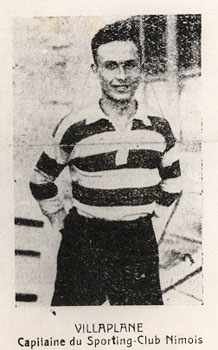A message from Stew: We are one day away from the start of the 2022 World Cup games. At this point, we don’t know which international teams will break out of group play and make it into the knock-out phase. Four years ago, France, or Les Bleus, was crowned champion. Didier Deschamps fields basically the same roster (sans Pogba) and is likely a contender once again. I don’t how well the USMNT will perform but we’re all rooting for them. I thought I’d reprint this blog from 27 May 2017 (with added commentary and images) to give you a brief historical perspective of the first World Cup game and introduce you to one of Le Bleus’s finest French footballers albeit a despicable human being and one of France’s most notorious collaborationists.
We’ve become immune to the stories we hear every day about professional athletes who get into trouble with the law. Their crimes range from acts of violence to murder and everything in-between.
Our story today is about one of these athletes. He was a French footballer: in other words, he played soccer. His saga starts with the first World Cup in 1930 and ends fourteen years later with his execution in front of a firing squad. During the occupation, he was well-known as a member of the Bonny-Lafont gang and developed a reputation as a vicious Nazi collabo (collaborationist).
Did You Know?
France has a very storied history behind its national football team (even though our blog today talks about a rather unscrupulous French footballer). France’s first international match was against Belgium on 1 May 1904 (a 3 to 3 draw). Its first World Cup appearance was in 1930 and the team has had fourteen subsequent appearances since then. Lucien Laurent became the first player to score in a World Cup (1930) however, France became the first team to not score in a World Cup match after losing 1−0 to Argentina in the 1930 World Cup Read More Les Bleus, Le Collabo et L’exécution




